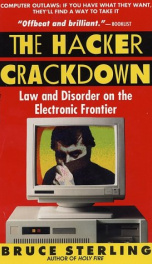The Hacker Crackdown, law and disorder on the electronic frontier

Bruce Sterling's classical work tells about the assail on hackers in 1990, when law-enforcement officials succeeded in arresting a lot of suspected illegal hackers and other criminals who worked with computers. These incursions became symbolic of the debate between struggling with serious computer crimes and protecting civil freedoms. However, "The Hacker Crackdown" is more than just story about many police operations. It's a vivid tour of three cyberspace subcultures – the world of hackers, the kingdom of the cybercops, and the idealistic life of cybercivil liberterians. At first the author tells about the birth of a cyberspace: the invention of the telephone. Thus appear first hackers – boys who worked as telephone operators. They used their technical skills, and love of tricks to cause damages of telephone lines. From simple phone-related hi-jinks, Sterling invites us to the world of hacking and introduces many of the culprits - some who are fighting for reason, some who are in it for kicks, and some who are ordinary criminals after a quick buck. Sterling in details describes the victories and failures of the people strained to deal with the illegal hackers and tells how they built-up their own subculture as cybercops. The author discusses the ethical and legal problems of online law enforcement by asking what rights are given to suspects and to those who have private e-mail kept on suspects' computers. "The Hacker Crackdown" tells about computer crimes, computer criminals and people who try to fight these crimes.
Info about the book
Author:
Series:
Unknown
ASIN:
055356370X
Rating:
4.5/5 (41)Your rating:
0/5
Languge:
English
Users who have this book
Users who want this book
What readers are saying
What do you think? Write your own comment on this book!
write a commentif you like The Hacker Crackdown, law and disorder on the electronic frontier try:
Other books by this author
Do you want to exchange books? It’s EASY!
Get registered and find other users who want to give their favourite books to good hands!

